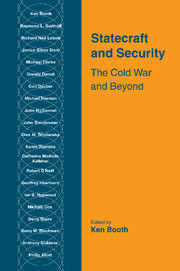Book contents
- Frontmatter
- Contents
- List of contributors
- Preface
- Introduction
- Part one Cold War: lessons and legacies
- 1 Cold Wars of the mind
- 2 Who is to blame for the Cold War?
- 3 Nuclear lessons of the Cold War
- 4 A Cold War life, and beyond
- Part two Post-Cold War: powers and policies
- Part three Beyond: resistances and reinventions
- Conclusion: security within global transformation?
- Index
4 - A Cold War life, and beyond
Published online by Cambridge University Press: 06 October 2009
- Frontmatter
- Contents
- List of contributors
- Preface
- Introduction
- Part one Cold War: lessons and legacies
- 1 Cold Wars of the mind
- 2 Who is to blame for the Cold War?
- 3 Nuclear lessons of the Cold War
- 4 A Cold War life, and beyond
- Part two Post-Cold War: powers and policies
- Part three Beyond: resistances and reinventions
- Conclusion: security within global transformation?
- Index
Summary
This chapter is radically different but intimately related to the others. It explores some of the major themes of the book by focusing on one individual's work. There are six main justifications for this. (1) It was argued earlier that Cold War structures were created, sustained and dismantled by human agents. A fuller understanding of the period requires the examination of individual lives, and not simply the decisions of governments. (2) The chapter offers students of strategy/security studies some insights into the sociology of their subject. Some of the most interesting thinkers (and some of the most influential) are not necessarily the best known, and students of international security during the Cold War overwhelmingly mistook opinion (fashionable/ethnocentric/self-interested) for objectivity. (3) The chapter hopes to empower students to think for themselves, rather than taking the easy option of thinking today what their elders and betters thought yesterday. There may not be much space for individuals to transcend their early conditioning and to exercise their ideas and imagination, but there is always some. The chapter shows that if an individual feels strongly about something, and has the knowledge and methodology to back it up, then he or she can make a difference. (4) The individual who is the subject of this chapter, Michael MccGwire, is one of the most interesting contributors to the debate about the Cold War and beyond.
- Type
- Chapter
- Information
- Statecraft and SecurityThe Cold War and Beyond, pp. 87 - 132Publisher: Cambridge University PressPrint publication year: 1998



